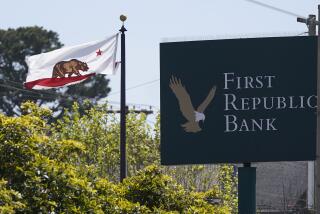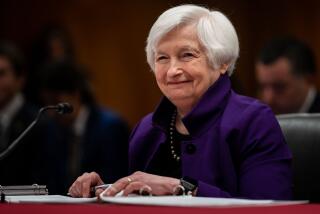The Great Bank Robbery
- Share via
President Bush is thinking about having depositors help finance the bailout of insolvent savings-and-loan institutions by imposing a special tax on their accounts. White House press secretary Marlin Fitzwater describes the idea as only a trial balloon for now. If so, it’s one that public opposition ought quickly to puncture. The notion of levying a direct tax on savers to repair the damage caused by the mistakes and corruption of certain bankers and the regulatory laxity of the federal government makes as much sense as taxing members of the armed forces to pay for cost overruns and fraud in the defense industry. Savers didn’t create the S&L; mess; they shouldn’t have to pay more than others to clean it up.
There’s no question, of course, that a lot of money will have to come from somewhere to cover the costs of closing down sick S&Ls; and paying off their federally insured depositors. Over the next three or four years the price tag for that could reach $70 billion or more. Treasury Secretary Nicholas F. Brady says that under consideration is a 25-cent tax on each $100 on deposit in any federally insured financial institution--banks and credit unions as well as S&Ls.; But why punish savers for the imprudence that pushed hundreds of S&Ls; into insolvency? Fairness aside, such a tax--the Administration prefers calling it a premium or fee--could be counted on to launch a flight of deposits from these institutions into uninsured money-market mutual funds, Treasury bills and other investments.
Three things are clear in the S&L; mess: The word of the government--its full faith and credit--requires protecting depositors against losses of up to $100,000 per account. Since there’s not enough money in the insurance plan set up for that purpose, the rescue effort will realistically have to be financed out of general funds, which is another reason why tax increases of some kind are rapidly becoming unavoidable. Finally, federal oversight of the S&L; industry, which has grown sloppy since deregulation came in the late 1970s, must be expanded and improved so that problem loans, bad administration and crooked managers can be spotted earlier.
These are the things that put the industry into such deep trouble. Savers who trustingly put their money into government-insured S&L; accounts had nothing to do with it.
More to Read
Inside the business of entertainment
The Wide Shot brings you news, analysis and insights on everything from streaming wars to production — and what it all means for the future.
You may occasionally receive promotional content from the Los Angeles Times.










